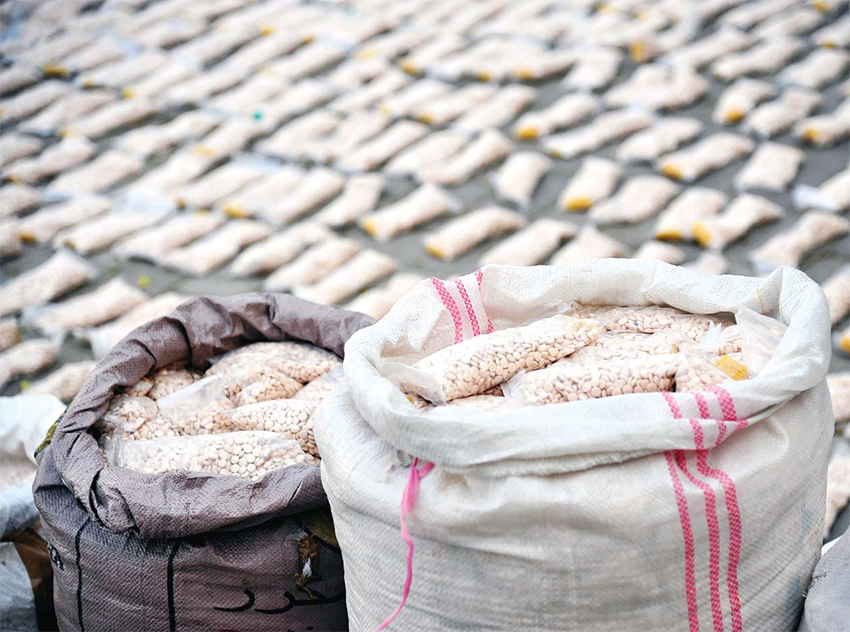10/06/2023
10/06/2023
Halting trade in amphetamine a high priority
BEIRUT, June 10, (AP): A little white pill has given Syrian President Bashar Assad powerful leverage with his Arab neighbors, who have been willing to bring him out of pariah status in hopes he will stop the fl ow of highly addictive Captagon amphetamines out of Syria. Western governments have been frustrated by the red-carpet treatment Arab countries have given Assad, fearing that their reconciliation will undermine the push for an end to Syria’s long-running civil war. But for Arab states, halting the Captagon trade is a high priority. Hundreds of millions of pills have been smuggled over the years into Jordan, Iraq, Saudi Arabia and other Gulf Arab countries, where the drug is used recreationally and by people with physically demanding jobs to keep them alert.

Saudi Arabia has intercepted large shipments of pills hidden in crates of fake plastic oranges and in hollowed out pomegranates - even pills crushed and molded to look like traditional clay bowls. Analysts say Assad likely hopes that by making even limited gestures against the drug he can gain reconstruction money, further integration in the region and even pressure for an end to Western sanctions. The vast majority of the world’s Captagon is produced in Syria, with smaller production in neighboring Lebanon. Western governments estimate the illegal trade in the pills generates billions of dollars.
The United States, Britain and European Union accuse Assad, his family and allies, including Lebanon’s militant Hezbollah group, of facilitating and profiting from the trade. That has given Assad’s rule a massive financial lifeline at a time when the Syrian economy is crumbling, they say. The Syrian government and Hezbollah deny the accusations. Syria’s neighbors have been the biggest and most lucrative market for the drug. As the industry flourished, experts say Damascus in recent years saw Captagon as more than just a cash cow. “The Assad regime realized that this is something they can weaponize for political gain … and that’s when production started being on a large scale,” said Karam Shaar, a senior fellow at Washington-based New Lines Institute. Stopping the trade has been a top demand of Arab countries in their talks with Syria on ending its political isolation. Syria was readmitted last month from the Arab League, from which it was suspended in 2011 because of Assad’s brutal crackdown on protesters.
On May 20, Assad received a warm welcome at the Arab League summit in Jeddah, Saudi Arabia. A possible sign of the behindthe- scenes trade-offs came on May 8, when airstrikes in southern Syria reduced the home of a well-known drug kingpin to rubble. Merhi al-Ramthan, his wife and six children were killed. Another strike destroyed a suspected Captagon factory outside the city of Daraa, near the Jordanian border. Jordan was likely behind the strike, with Assad’s consent, say activists and experts. The strike came one day after the Arab League formally re-admitted Syria, a step Jordan helped broker.
“Assad gave assurances that he would stop the regime from supporting and protecting smuggling networks,” a former brigadier general of Jordan’s intelligence service, Saud Al-Sharafat, told The Associated Press. “For example, he facilitated the disposal of al-Ramthan.” Jordan, he said, sees the Captagon trade as “a threat to both security and communal peace.” In public comments, Jordan’s foreign minister, Ayman Safadi, refused to confirm or deny whether his country was behind the airstrikes but said it was willing to take military action to curb drug smuggling.
Arab states, many of which had backed the rebels trying to oust Assad, say they share the goal of pushing him to make peace. Ahead of the Jeddah summit, Jordan hosted a meeting of top diplomats from Syria, Saudi Arabia, Iraq, and Egypt, and the long agenda included setting a roadmap for peace talks and the return of millions of Syrian refugees. But it was on Captagon where the gathering made the most progress. Syria pledged to clamp down on smuggling, and a regional security coordination committee was agreed on. Days later, Syrian state media reported that police quashed a Captagon smuggling operation in the city of Aleppo, discovering 1 million pills hiding in a pickup truck.


